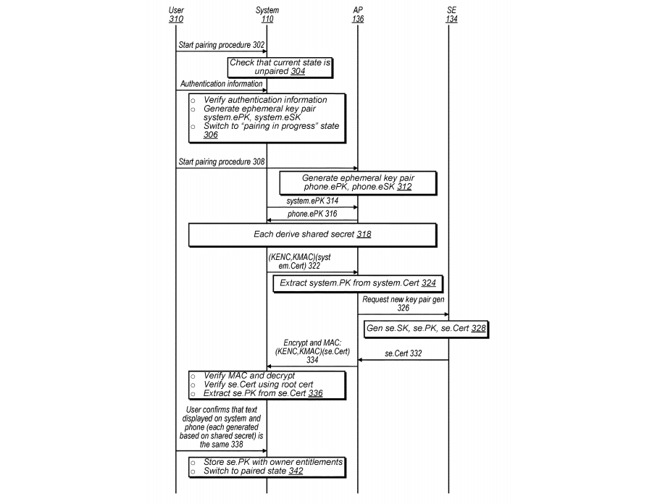

The first beta of iOS 13.4 revealed traces of a "CarKey" API, one that would turn the iPhone into an electronic key for a vehicle, similar to the unlocked and bootable systems used today. By approaching the iPhone with an NFC point, it could feasibly allow a car to start and run, while also offering the option to share a key version to others with certain deactivated permissions, such as unlocking a car. but not driven.
In a patent application entitled "Access to the system using a mobile device" published Thursday by the US Patent and Trademark Office, Apple seems to be planning a much wider use of the concept than in vehicles. The submission summary states that it would be used to authenticate a mobile device for access to system functionality, including "physical access to a system, starting an engine".
This could mean more than a car and could easily be applied to other access-oriented systems, such as a smart door lock, access to a work desk, or connecting to a computer, such as already offered by Apple Watch.
The patent application largely covers the possible processes for performing an authentication check between the smartphone and the interlock system with which it interacts, rather than its possible applications.

A graph showing how the process of pairing and authentication could flow
In short, the pairing system involves the creation of public and private keys both on the mobile device and on the sides of the locked system, as part of the pairing process. After pairing, public keys and a shared secret from the association process are used to verify a signed certificate created with private keys, then an encrypted signature is transmitted as proof of verification, allowing for additional trusted communication.
In various statements, this may include the mobile device set not to send identifying information until after verification of the signed certificate and key exchange using a "Diffie Hellman (DH) elliptic curve diffusion function".
It is also proposed that the mobile device be able to share access to the functions of the locked system with another device, through another similar process of signing certificates. Sharing could be done through a private and direct wireless connection between the two mobile devices, without relying on an online server or messaging service to teach access.
There are mentions about using a security token as a form of authentication between mobile devices, which can be stored in a separate mailbox location for later access.
While it can be transmitted, the sharing system would also allow the initially authorized device to revoke shared access, sending a revocation message, which is followed by a confirmation receipt generated by a secure circuit.
If implemented in the CarKey API, this may allow a driver to temporarily grant access to his / her car on a friend's device, locally or remotely, with the possibility of unlocking the vehicle only for access and not driving it, then revoke the access permission later. Elsewhere, this could feasibly grant access to a building to an individual without the need to physically pass a key.
The concept of digital keys on mobile devices is pretty good for rental services. For example, an AirBNB host might give guests a temporary use key on their device during the visit, or a car rental business could provide car keys to a customer without needing a kiosk or local store.
The patent application lists its inventors as Arun G Mathias, Florian Galdo, Matthias Lerch, Najeeb M. Abdulrahiman, Onur E. Tackin and Yannick Sierra.
Apple files numerous patent applications weekly. Although the existence of a patent application does not guarantee that the concept will appear in a future product or service, it does inform the areas of interest for Apple's research and development efforts.
Apple has previously looked at the use of a mobile device as an authentication token for external use, including the possibility of it being used to safely present the government code. This could mean that an iPhone has the chance to be used as an efficient digital passport or driver's license, depending on future legislative changes.
On the power side, Apple is a charter member of the Car Connectivity Consortium, which released its first Digital Key Release 1.0 standard for NFC-enabled smartphone interactions with a vehicle in 2018. As a charter member, Apple is largely expected to implement standards. defined by such technical groups.
Apple also filed a patent application for "enhanced automotive passive input" in August 2018, which suggested using magnetic antennas and radio frequency antennas to determine the range of an iPhone in a vehicle, to activate the features location-based. A November 2019 patent proposed a similar idea, using Bluetooth and Ultra-Wideband to determine location and change cryptographic keys.
It remains to be seen if the Apple Car rumor will often be used.
HomeKit.Blog is in no way affiliated with or endorsed by Apple Inc. or Apple related subsidiaries.
All images, videos and logos are the copyright of the respective rights holders, and this website does not claim ownership or copyright of the aforementioned.
All information about products mentioned on this site has been collected in good faith. However, the information relating to them, may not be 100% accurate, as we only rely on the information we are able to gather from the companies themselves or the resellers who stock these products, and therefore cannot be held responsible for any inaccuracies arising from the aforementioned sources, or any subsequent changes that are made that we have not been made aware of.
HomeKit.Blog Is A Participant In The Amazon Services LLC Associates Program, An Affiliate Advertising Program Designed To Provide A Means For Sites To Earn Advertising Fees By Advertising And Linking To Amazon Store (Amazon.com, Or Endless.com, MYHABIT.com, SmallParts.com, Or AmazonWireless.com).
The opinions expressed on this website by our contributors do not necessarily represent the views of the website owners.